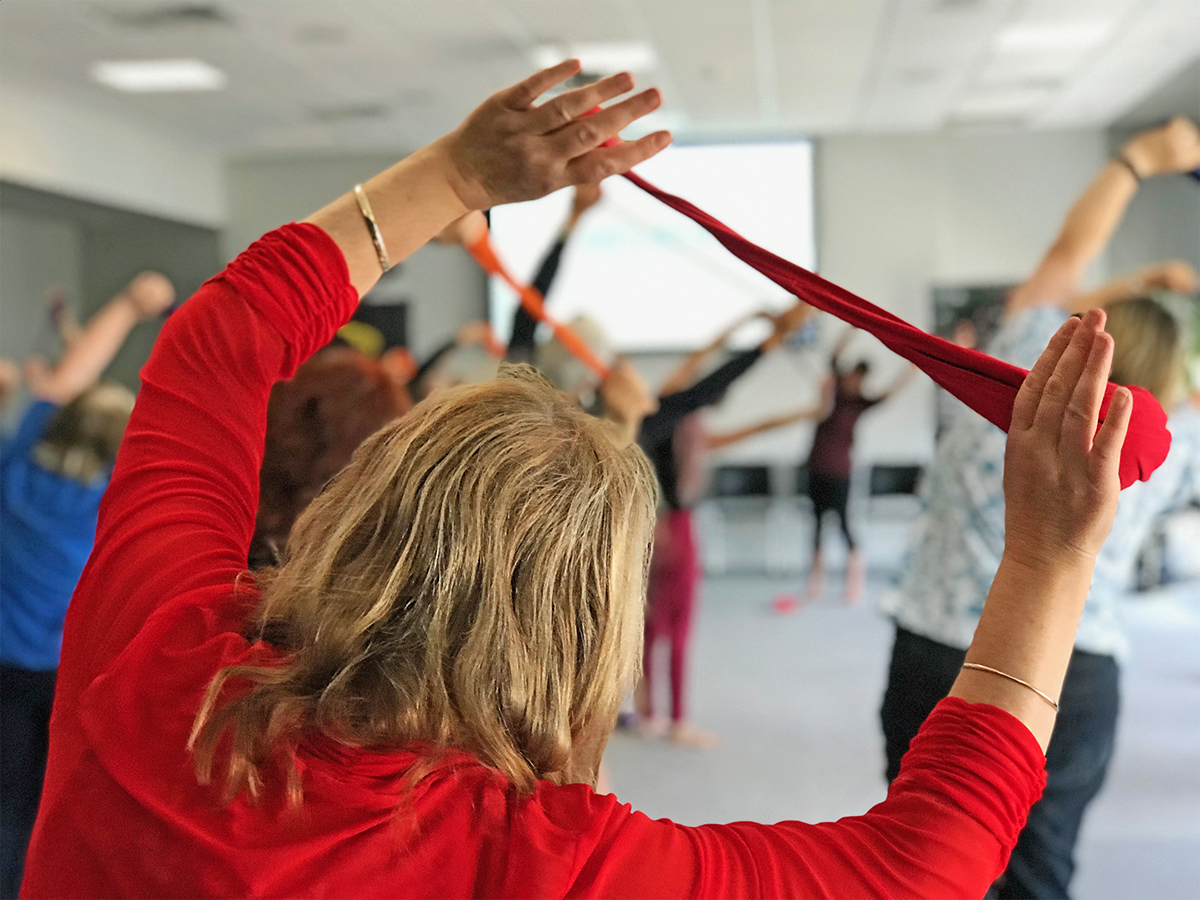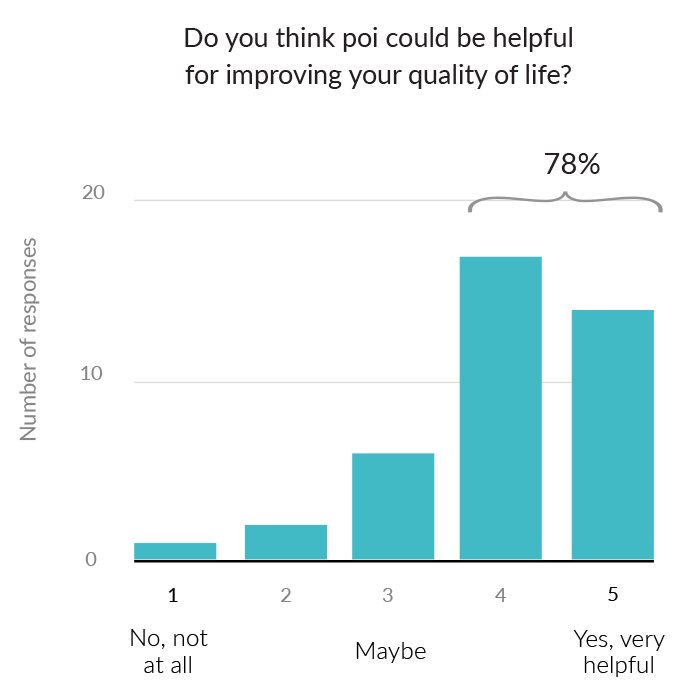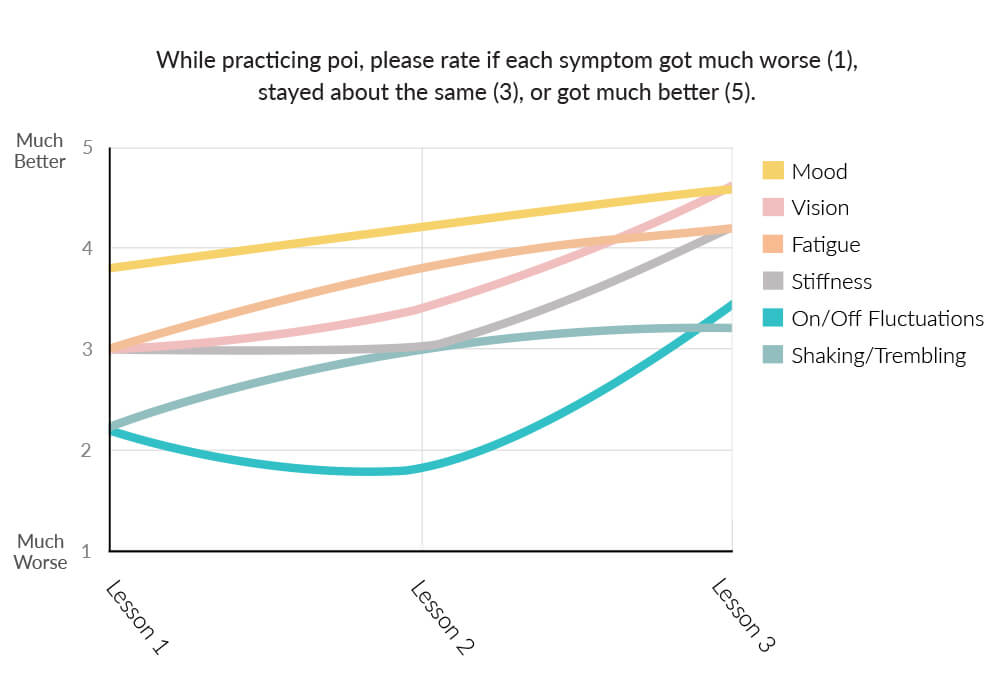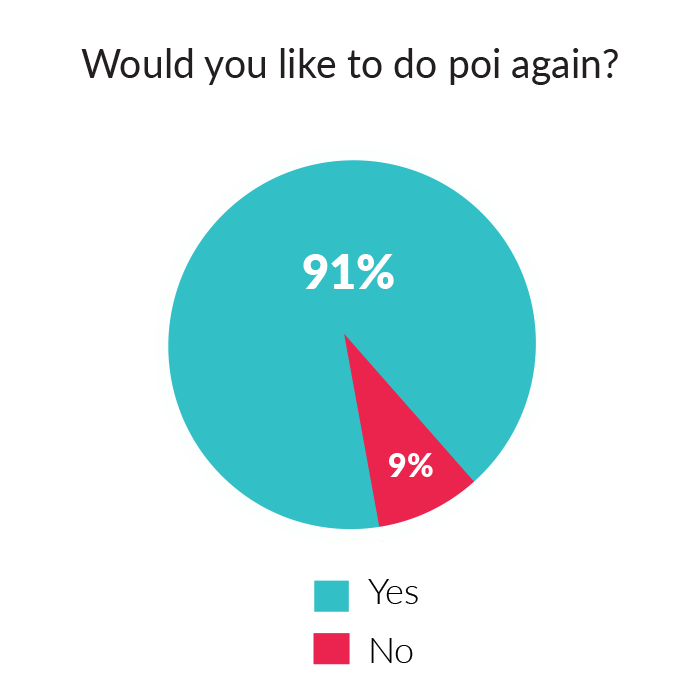Early Research on Poi and Parkinson’s Shows Promise for Improving Quality of Life
Spinning a weight on the end of a cord in circles may be the next Parkinson’s physical therapy treatment.
Download the Poi & Parkinson’s .pdf for further details on this work

More than 10 million people worldwide are living with Parkinson’s Disease (PD), a neurodegenerative condition that affects the brain and nervous system. There is currently no cure for PD, but we know exercise and movement play a vital role in fighting the disease and improving quality of life.¹ In 2020, the first research was conducted on PD and a type of movement called poi, which involves spinning a weight on the end of a flexible cord in circles around the body. The research was conducted after a clinical study on poi and healthy older adults proved significant improvements in grip strength, balance, and attention after just one month of poi practice.²
What the Research Shows
39 Parkinson’s fighters participated in poi sessions at The Parkinson’s Exercise & Wellness Center (USA), Inn Klinikum Altötting und Mühldorf (Germany), and Move Good Now (New Zealand). After practicing poi, participants filled out a self-reported questionnaire regarding their experience including any changes in symptoms, the potential for poi to improve quality of life, and their desire to practice poi again.
1. Improving Quality of Life
78% of participants reported that poi could be helpful in improving quality of life, with another 15% answering maybe.

These responses are promising and are supported by observations from Sarrisa Curry, Founder at The Parkinson’s Exercise and Wellness Center. Sarrisa states, “Poi has layers upon layers of skill to learn and master. We have barely scraped the surface at our Center and have been amazed at the outcomes.” Sarrisa noticed an intensity of thought and focus on mobility while practicing poi, and gait improvement when the poi were moving in sync. She also said her participants observed an unusual heightened awareness of their movements after poi sessions, which sometimes lasted up to 2 days. “I am very excited to see what further research will show for the PD community.”
2. Reduced Symptoms Over Time
Five participants from Inn Klinikum Altötting und Mühldorf in Germany participated in multiple poi lessons over time. The graph below represents the effects of poi on their symptoms over time, showing a trend of improvement in all symptoms with each poi session.

Observations by Certified SpinPoi Instructor and lead researcher at Inn Klinikum Altötting und Mühldorf, Anja Lohoff, are consistent with the trends above. Anja states, “Especially in Parkinson’s patients, it is sometimes unbelievable to observe how their stiffness dissolves during poi play, how their focus is directed towards the poi and how accompanying symptoms – such as trembling in the hands or restlessness in the legs – steadily decrease or simply fade away.” Part of the reason poi may be particularly beneficial for mitigating PD symptoms is that it’s both physically and cognitive engaging. Emerging research shows that a multimodal regime (both physical and cognitive exercises) may be more beneficial for improving both motor and non-motor Parkinson’s symptoms.³
3. Enjoyment and Improved Mood
Participants were asked if they would like to practice poi again, with 91% answering yes.

Enjoyment is a very important quality for a therapeutic intervention. If something is enjoyable, you’ll want to do it again. Hilary Williams, lead researcher at Move Good Now, stated that everyone who took part in the research enjoyed working with poi, and there was lots of laughter during the sessions. Anja noticed a similar phenomenon, and stated, “From simple swinging to practicing some basic poi movements standing to dancing together, participants enjoyed the lessons. I’ve noticed how the mood of the participants improves through the movement to the music, which in turn leads to the stabilization of the general condition.”
Enjoyment and improvement in mood are particularly important for those with PD, as depression and anxiety actually have a larger negative impact on quality of life than the movement symptoms. According to the Parkinson’s Foundation, “Mood changes happen to everyone, but in people with PD mood can become disordered, with changes that are extreme and persistent or inappropriate to the social context.”⁴ As a form of both play and exercise, poi has a double whammy of mood boosters that may help those with PD regulate their emotions and continue living their best life.
Paving the Way for the Future of Poi and Parkinson’s
Overall, the data and observations from this preliminary study show promise for poi’s potential to improve quality of life for those with PD. Through a mix of skill-based and aerobic movements, poi offers the opportunity for both physical/motor and cognitive engagement, as well as being a fun, accessible, and unique intervention. Hilary of Move Good Now said “Poi is so different to the other activities we do in class (boxing and dance based), and that’s one of the main reason my participants enjoyed it.”
Further research on poi and PD is paramount in order to better understand its effects, and how it may be beneficial for improving quality of life, one orbit at a time.
Want to Give it a Spin?
If you are one of the 10 million PD fighters across the globe, or are just looking for a new way to keep your mind and body fit, then it’s time to get up and spinning! Why not download our FREE poi & wellbeing guide, or start your journey with our easy to follow videos on how to make poi and master your first moves.

SOURCES
1. Parkinson’s outcomes project. Parkinson’s Foundation. https://www.parkinson.org/research/Parkinsons-Outcomes-Project
2. Riegle van West, K., Stinear, C., & Buck, R. (2019). The Effects of Poi on Physical and Cognitive Function in Healthy Older Adults. Journal of aging and physical activity, 27(1), 44-52.
3. Ferrusola-Pastrana, Anna. “Can exercise preserve motor and non-motor function in Parkinson’s?.” (2019).
4. Mood, A Mind Guide to Parkinson’s Disease. (2018). Parkinson’s Foundation. https://www.parkinson.org/sites/default/files/attachments/Mood.pdf
About the Author: Dr. Kate Riegle van West is a scientist, artist, and entrepreneur with a passion for play and wellbeing. She completed her PhD in the health benefits of poi at the University of Auckland, and is the global leading exponent in working with poi and health.
